386 Search Results for complex communication
October 7, 2021
by Carole Zangari -
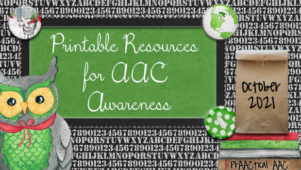
Many AAC professionals are known for their generosity in creating and sharing resources to support individuals with complex communication needs. In today’s post, we feature a sampling of some that can be helpful during AAC Awareness Month and beyond. Print and display an AAC Poster. From The AAC Coach: Never Too Late or Early From CoughDrop: Keys to Modeling From Rachael Langley: Subway Art From Lauren Enders: AAC Do/Do Not From Kate Ahern: The Periodic Table of AAC From Noodle Nook: 5 Tips for Communicating with Nonverbal Students From Scope: Speak Up and Be Safe From PrAACtical AAC: More Teaching, Less Testing Share handouts Print, hang, or give someone an AAC awareness image 10 Commandments of AAC Devices Hanen Center: Tips for Parents of Children Who Communicate Without Words Susan Berkowitz: Partner Strategies for Augmentative Communication Scope: AAC Strategies in Healthcare Settings Have fun with AAC memes created by a... [Read More...]
October 4, 2021
by Carole Zangari -
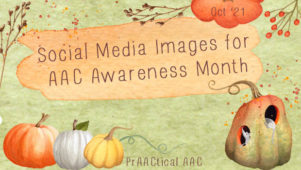
Are you looking for ways to support AAC Awareness Month on Facebook, Instagram, or Twitter? If you’re on a mission to help people with complex communication needs get access to AAC, join our efforts to boost the presence of AAC on your social media feeds. Today’s post has a selection of AAC Awareness Month graphics to choose from. These are not branded or watermarked so you can use them freely. Download some Facebook banners and profile images for AAC Awareness Month 2021 by clicking on the images below. Facebook Banner Image Facebook Profile Image Facebook Banner Image Facebook Profile Image You can grab another style of Facebook banner here. Is Instagram your jam? We’ve got you covered. (Click on the images below to download.) Twitter Are you more of a Twitter fan? No worries. We’ve got something for you, too. (Click on the image below... [Read More...]
September 30, 2021
by Carole Zangari -
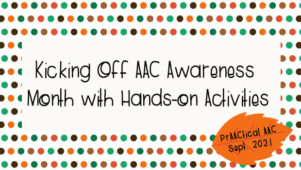
Tonight we’ll be turning the page on the calendar and preparing to celebrate AAC Awareness Month! For the past decade, October has given us some extra opportunities to spread the word about all things AAC, and it’s pretty exciting to think back on all we’ve done and also to plan for the current year. Each week during AAC Awareness Month we’ll share suggestions for things to do to help others learn about a field that emerged to support children and adults with complex communication needs. This week, we’ll focus on hands-on activities. A popular approach to AAC Awareness Month is to invite a group of colleagues or families to come together and communicate only through AAC for the event. Some years, we’ve held ‘Silent Snack’ events before class where we put out a variety of board games and invited some of our AAC clients to come in and play along.... [Read More...]
September 12, 2021
by Carole Zangari -
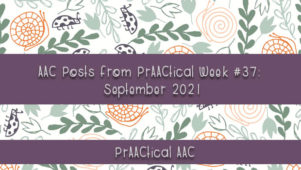
Happy Sunday, AAC friends. Here are some posts you may have missed. Monday – A PrAACtical Labor Day Tuesday – AAC Link Up Wednesday – Video of the Week: Reading and Talking with AAC Thursday – AAC Round-up: Preschoolers with Complex Communication Needs ::::::::::::::::::::::::::::::::::::::::::::::::::::::::::::::::::::::::::::::::::::::::::::::::::::: We’ve got a few more posts for you to browse. On the Same Page: Helping Team Members Recognize and Respond to Unconventional Communication Signals From Referential to Descriptive Teaching with AAC Learners Aided Language Input – How Much Language Should We Model? PrAACtical Resources: Promoting Inclusion and Participation for People Who Use AAC When Students are Reluctant to Use AAC: 5 Things to Try
August 29, 2021
by Carole Zangari -
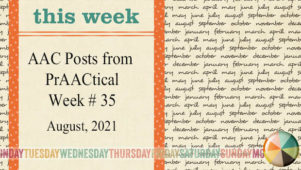
Happy Sunday, AAC friends. We have a few AAC posts for you to explore. Monday – PrAACtical Considerations: An Introduction to Fair Testing Practices in AAC Tuesday – AAC Link Up Wednesday – Video of the Week: Introduction to Literacy for Students with Complex Communication Needs Thursday – Growing AAC Professionals: AAC-friendly Classrooms, AAC for Toddlers, & AAC for Healthcare Providers ::::::::::::::::::::::::::::::::::::::::::::::::::::::::::::::::::::::::::::::::::::::::::::::::::::::: Here are a few more for your browsing pleasure. AAC and Visual Supports for Storms and Hurricanes: 10 Useful Resources How I Do It: Cooking in the Classroom with Carol Goossens’ How I Do It: Conversation Practice with Teens and Young Adults by Angela Adams On AAC Training: Skill Building for AAC Team Members PrAACtical Resources: AAC 101 Flipbook Handout
August 9, 2021
by Carole Zangari -
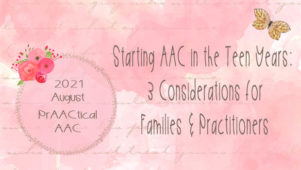
For children with complex communication needs, we often suggest starting AAC in early childhood as a way to support communication, speech, and language development. But in some cases, things don’t work out that way. Children with complex bodies have a lot to learn in those early years and families often prioritize things other than communication for lots of good reasons. They may be building basic survival skills, like breathing, swallowing, and eating. They may be adjusting to feeding tubes or tracheostomies. Some may be helping children learn to sit, hold their heads up, reach for things, or develop mobility skills. Others may be dealing with difficult-to-control seizures, debilitating sleep disorders, or significant medical challenges. Sometimes, things don’t come together to support AAC until years later. William’s team was learning to understand his sensory and behavioral challenges throughout much of elementary school, and exploring ways to support him so that he... [Read More...]
August 2, 2021
by Carole Zangari -

Writing goals for AAC learners, whether they are beginning communicators or focusing on more advanced linguistic concepts, can be tricky and intimidating. Today, we introduce a new series authored by PrAACtical AAC friend and AAC/AT expert Lauren Enders to give us insight on the process and tips for developing strong goals and objectives. Throughout this series, Lauren shares her perspective developed from her years of experience in public schools and as a nationally recognized presenter. :::::::::::::::::::::::::::::::::::::::::::::::::::::::::::::::::::::::::::::::::::::::::::: Though it may be hard to believe, back-to-school is around the corner! As we get ready to head back into the classroom, now seems like the perfect time to launch a series exploring best practices to consider when writing IEPs for our AAC learners. The thought of crafting IEP goals and objectives for students who are learning to use AAC strikes fear into the hearts of many SLPs, special education teachers, and other school... [Read More...]
July 21, 2021
by Carole Zangari -
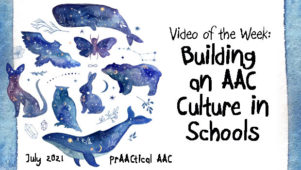
Creating environments where AAC is readily accessible and widely appreciated is important to AAC stakeholders, whether they are professionals, families, or individuals with complex communication needs. Today, we feature a presentation from AAC in the Cloud by AAC SLPs Amanda Hartmann and Barbara van’t Westende that addresses how we can break down barriers to foster a community of AAC acceptance and support in school settings. Many thanks to Barbara, Amanda, and to CoughDrop for this helpful session. You can download the handout for this presentation here. Direct link to video – https://www.youtube.com/watch?v=ASZ55EWtRv0&ab_channel=CoughDrop
July 15, 2021
by Carole Zangari -
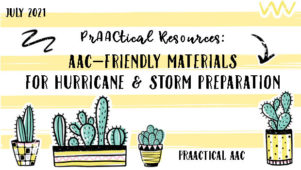
We’re well into hurricane season here in South Florida and so we’re thinking about ways to support people with significant communication challenges. We can’t predict when extreme weather or other natural disasters will strike, but we can prepare. Here are a few resources that you might find helpful. Reassuring Books About Storms for Children by Heather at Books & Giggles It is Hurricane Season by Autism Educators Preparing for Natural Disasters by Smarty Symbols Hurricane Preparation by Mary Grace Hektner via Boardmaker Online (need Boardmaker to use) What Is A Hurricane? by Mary Grace Hektner via Boardmaker Online (need Boardmaker to use) Tornado Vocabulary by Mary Grace Hektner via Boardmaker Online (need Boardmaker to use) Storm Social Narrative by Sandy K via Boardmaker Online (need Boardmaker to use) Storm Surge Narrative by Mary Grace Hektner via Boardmaker Online (need Boardmaker to use) Webinar on Disaster Preparedness for People with Complex... [Read More...]
July 2, 2021
by Carole Zangari -
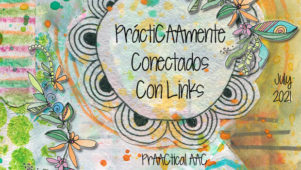
AAC friends, if you’re interested in AAC materials in Spanish, please check out the content in this list and feel free to add your own. In addition to these resources, you may also enjoy learning about the work of Wendy Moreno, a parent of an AAC user in Mexico. :::::::::::::::::::::::::::::::::::::::::::::::::::::::::::::::::::::::::::::::::::::::::::::::::::::::::::::: Estamos comenzando Julio compartiendo links en español, continuamos nuestro recorrido por el mundo conociendo experiencias de CAA en español, esta vez llegamos a México donde Wendy Moreno, nos comparte sus reflexiones y vivencias. PREGUNTAS AUMENTATIVAS Y RESPUESTAS ALTERNATIVAS ¿Qué pasaría si un día, tan sólo un día, nuestra comunicación se limitará a responder preguntas cerradas sin hacer uso de nuestra voz? Seguramente algo se nos ocurrirá para darnos a entender. Pero ¿qué pasa cuando la misma pregunta se la hacemos a una persona que, por su discapacidad, presenta necesidades complejas de comunicación? Muchos, podríamos conformarnos con: “responde a un sí ... [Read More...]









